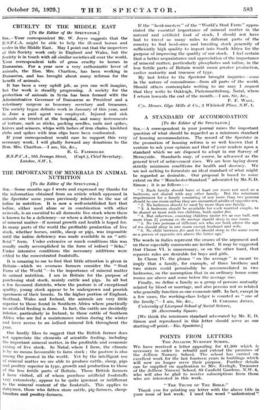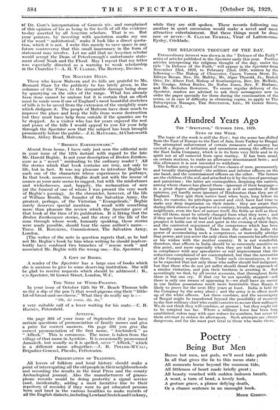POINTS FROM LETTERS THE JELLICOE NURSERY SCHOOL.
WE have received a letter appealing for 11,200 which is necessary in order to rebuild and extend the premises of the Jellicoe Nursery School. The school has carried on excellent work for the last fourteen years in buildings which will now no longer serve their purpose. Further details can be supplied on application to Mrs. Evelegh, Treasurer of the Jellicoe Nursery School, 63 Canfield "Gardens, N.W. 6, who will also be glad to receive subscriptions from those who are interested in this work.
"Tim Taurn OF Tim BIBLE."
Thank you for printing my letter with the above title in your issue of last week. I used the word " unhistorical ".
Of Dr. Gore's interpretation of Genesis xiv. and complained of this opinion of his as being in the teeth of all the evidence to-day asserted by all Assyrian scholars. That is so. But your printers, by investing with quotation marks my use of the word "unhistorical," make it look like a direct quota- tion, which it is not. I write this merely to save space in any future controversy that this small inaccuracy in the form of statement may involve. Let me add that no Assyrian scholar would accept the Dean of Peterborough's unfortunate state- ment about Noah and the Flood. May I repeat that my letter was especially directed as a warning to weak scholarship in the Churches ?—A. H. T. CLARK.E, The Rectory, Devizes.
THE MALVERN HILLS.
Those who know Malvern and its hills are grateful to Mr. Bernard Shaw for the publicity he has lately given, in the columns of the Times, to the irreparable damage being done by quarrying on the sides of the range. What has already been done cannot be undone but it is certain that an effort must be made soon if one of England's most beautiful stretches of hills is to be saved from the extension of the unsightly scars which disfigure it. The people of Malvern have done much to improve the place and keep the hills from worse destruction but they must have help from outside if the quarries are to be stopped. As a visitor who has for years enjoyed the rest and peace of the hills I would appeal to you for your help through the Spectator now that the subject has been brought prominently before the public.—J. G. MAYNARD, At Chatsworth House, Abbey Road, Malvern.
"BROKEN EARTHENWARE."
Absent from home, I have only just seen the editorial note fn your issue of the 12th instant with regard to the late Mr. Harold Begbie. Is not your description of Broken Earthen- ware as a " novel " misleading to the ordinary reader ? All the stories which that book contains are true, not only to life, but in fact. It was my pleasure to introduce Begbie to each one of the characters whose experiences he portrays. In that book, moreover, Begbie dealt not with the rescue of women as your note seems to suggest, but with the misfortunes and wickednesses, and, happily, the reclamation of men (at the funeral of one of whom I was present the very week of Begbie's passing). As the chronicler, however, of the life of William Booth, the founder of the Salvation Army, the greatest, perhaps, of the Victorian "Evangelicals," Begbie surely deserves special mention. I recall with something more than pleasure the review which the Spectator gave of that book at the time of its publication. It is fitting that the Broken Earthenware stories, and the story of the life of the man through whose work, humanly speaking, those stories were made possible, should bear the same author's name.- THEO. H. KITCHING, Commissioner, The Salvation Army, London.
[The writer of the note in question regrets that, as he had not Mr. Begbie's book by him when writing he should inadver- tently have confused two branches of "rescue work" and associated Mr. Begbie with the wrong one.—En. Spectator.] A GIFT OF BOOKS.
A reader of the Spectator has a large case of books which she is anxious to give to some deserving institution. She will be glad to receive requests which should be addressed : B., clo Spectator, 99 Gower Street, London, W.C.
THE NOTE OF WOOD-PIGEONS.
In your issue of October 12th Sir W. Beach Thomas tells us (by a slip of the pen ?) that wood-pigeons sing their "little- bit-of-bread-and-no-cheese." What they do really say is :— " Oh, do come, dó, do,"
a very suitable call of a lover waiting for his mate.—C. R. HAI/4Es, Petersfleld.
AFFLECK.
• On page 383 of your issue of September 21st you have certain questions of pronunciation of family names and give a prize for correct answers. On page 392 you give the correct pronunciation of the first name, " Auchinleck " as " Aflieck." This is erroneous. The name is taken from the village of that name in Ayrshire. It is occasionally pronounced Annaleek, but usually as it is spelled, never "Attica," which is a different name altogether.—J. B. PoLLoic-M'CALL; Brigadier-General, Phesdo, Fettereairn.
PRESERVATION OF TRADITION.
All lovers of folklore and local history should make a point of interrogating all the old people in their neighbourhoods and recording the results in the local Press and the county Archaelogical journal. Also the manufacturers of gramo- phone records would be doing posterity a signal service (and, incidentally, adding a most lucrative line to their repertory of records) if they were to get educated persons born and bred in the various localities to make records of all the English dialects, including Lowland Scotch and Cockney; while they are still spoken. These records following one another in quiet succession would make a novel and most attractive entertainment. But these things must be done now or never.—S. CLAUDE TICKELL, Vicar of Latton-cum- Eysley, Cricklade.



















































 Previous page
Previous page